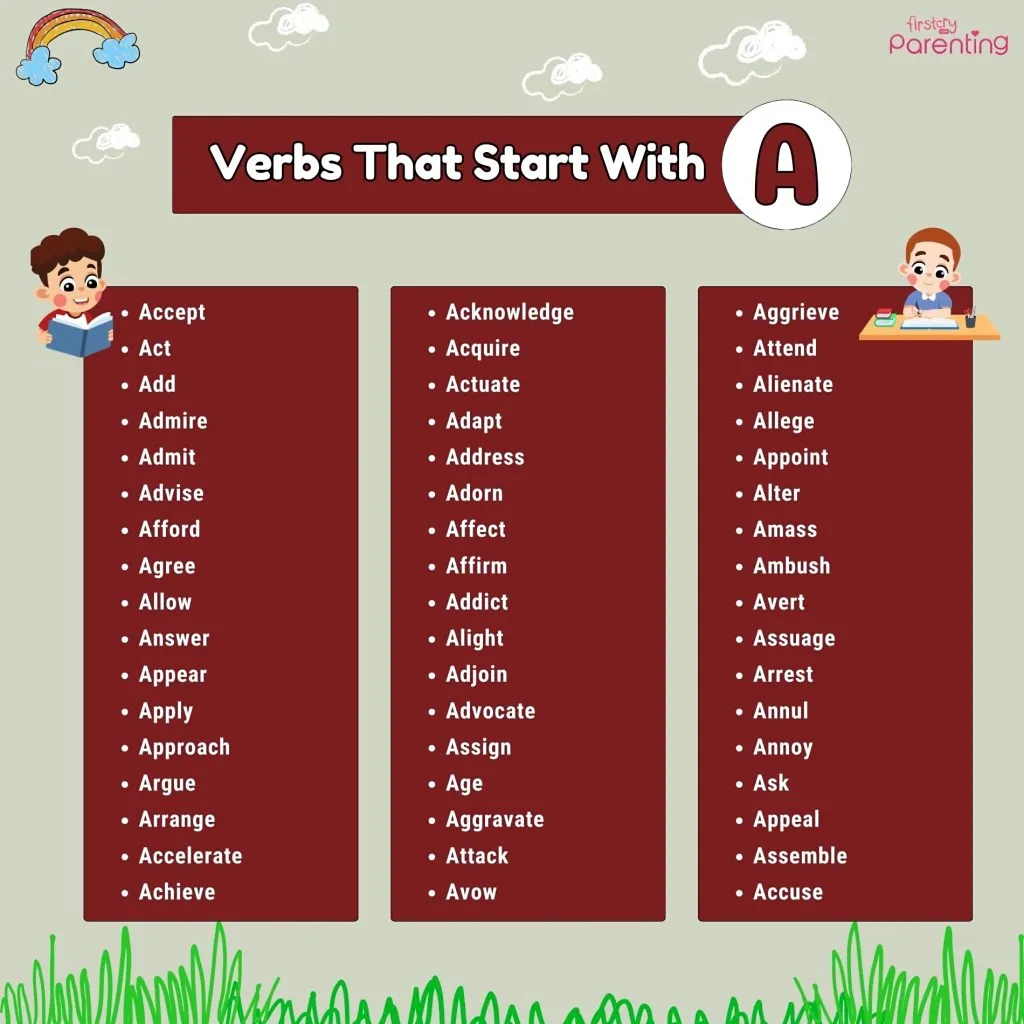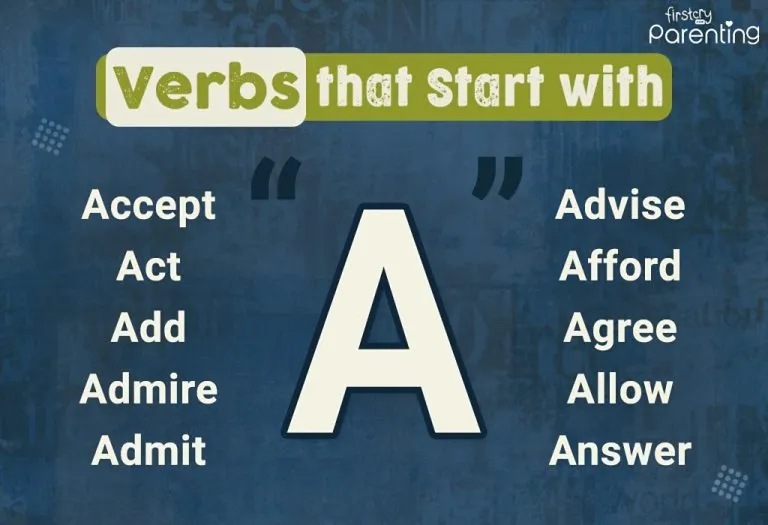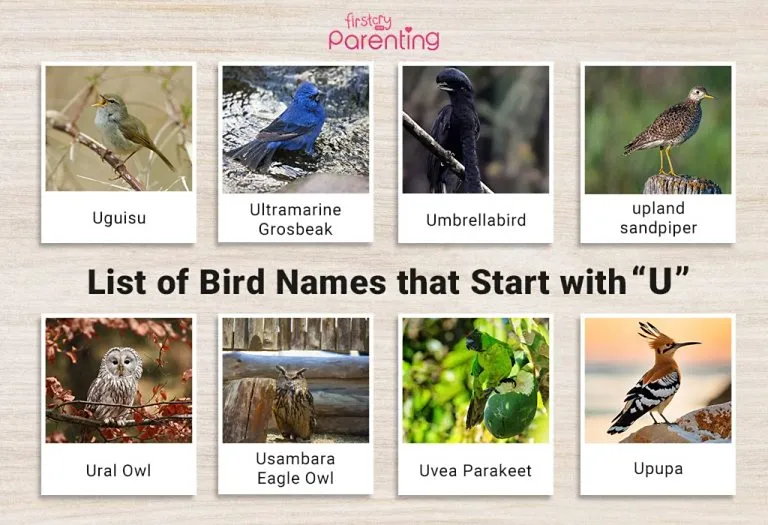Verbs That Start With A in English (With Meanings & Examples)
- What Are the Verbs Beginning With A?
- Common Verbs Starting With A
- Action Verbs That Start With A
- Positive Verbs That Start With A
- More Verbs That Begin With A
- FAQs
- Also, Discover the Verbs That Start With A to Z
Welcome to a delightful journey into the world of words, specifically focusing on verbs that start with the letter ‘A’. This article is designed to be a playful and educational resource for preschoolers, kids, and anyone eager to enrich their vocabulary. When we think of “verbs that start with A for preschoolers and kids,” we often consider how these words can open up a world of imagination and understanding for young minds. Verbs are the action heroes of language, bringing sentences to life. As we explore these verbs, remember that language is a playground, and words like these are the swings and slides, inviting kids to enjoy and learn. Let’s dive into the vibrant vocabulary for kids, starting with our special letter ‘A’!
What Are the Verbs Beginning With A?
Verbs starting with ‘A’ are a diverse and essential group of words in the English language. These verbs with ‘A’ covers a wide range of actions and states, from simple, everyday activities to complex, abstract concepts. They form the backbone of many sentences, helping us express actions, emotions, and states of being in colourful and dynamic ways.
Common Verbs Starting With A
This section will explore some of the most common English verbs starting with ‘A’. These verbs are foundational for building sentences and crucial in helping young learners understand the vast array of actions and emotions. From ‘accept’ to ‘argue,’ each verb plays a vital role in shaping our communication. Let’s dive into these fascinating verbs and see how they are used in everyday language.
1. Accept
To receive something willingly.
Example: She accepted the gift graciously.
2. Act
To do something for a particular purpose or to behave in a specified way.
Example: He acted bravely in a challenging situation.
3. Add
To join something to something else to increase the size, number, or amount.
Example: Let’s add some sugar to the tea.
4. Admire
To regard with respect or warm approval.
Example: They always admire the beauty of nature.
5. Admit
To confess or acknowledge something.
Example: She admitted she was wrong.
6. Advise
To offer suggestions about the best course of action to someone.
Example: The teacher advised the students to study hard.
7. Afford
To have enough money to be able to buy or do something.
Example: Can we afford a new car this year?
8. Agree
To have the same opinion about something, to consent.
Example: They agreed on a plan to meet next week.
9. Allow
To permit someone to do something.
Example: Her parents allow her to watch TV after homework.
10. Answer
To respond to a question.
Example: He answered the question correctly.
11. Appear
To become visible or to be seen.
Example: The sun appeared from behind the clouds.
12. Apply
To make a formal request or application.
Example: She applied for the job yesterday.
13. Approach
To come near to something or someone in space, time, quality, or amount.
Example: The cat slowly approached the mouse.
14. Argue
To give reasons or cite evidence supporting an idea, action, or theory, often to persuade others to share one’s views.
Example: They argued over the best route to take.
15. Arrange
To organise or make plans for something such as a meeting, party, or trip.
Example: She arranged the flowers beautifully in the vase.
Action Verbs That Start With A
Action verbs that start with the letter ‘A’ are dynamic and vivid, bringing energy and clarity to our sentences. These verbs are essential in describing specific actions in storytelling, daily conversation, or academic writing. Here, we’ll explore 15 such verbs, each illustrating a distinct action, to enrich our understanding of how these “verbs start with the letter A” words function in English.
1. Absterge
To cleanse or wipe away.
Example: She used a cloth to absterge the spill from the table.
2. Accelerate
To increase in speed or rate.
Example: The car accelerated as it entered the highway.
3. Achieve
To successfully reach a desired or intended goal, typically as a result of effort.
Example: She achieved her dream of becoming a doctor.
4. Acknowledge
To recognise the existence or importance of something.
Example: He acknowledged the hard work of his team.
5. Acquire
To buy or obtain something for oneself.
Example: They acquired a new piece of art for their collection.
6. Actuate
To cause a machine to operate.
Example: The engineer actuated the control panel.
7. Adapt
To make something suitable for a new use or purpose; to modify.
Example: Animals adapt to their environment to survive.
8. Address
To speak to someone directly to deal with an issue.
Example: The manager addressed the employees at the meeting.
9. Adorn
To make it more beautiful.
Example: She adorned the room with flowers for the party.
10. Affect
To affect one, to make a difference.
Example: The weather can significantly affect our mood.
11. Affirm
To state something as a fact; assert strongly and publicly.
Example: He affirmed his commitment to the project.
12. Aid
To help, assist, or support someone or something.
Example: Doctors aid patients in their recovery.
13. Alert
To warn someone of a danger.
Example: The system alerted the residents to the storm.
14. Align
To place or arrange things in a straight line.
Example: The engineer aligned the gears correctly.
15. Allocate
To distribute resources or duties for a particular purpose.
Example: The committee allocated funds for the new project.
Positive Verbs That Start With A
Positive verbs that start with ‘A’ have a unique charm, bringing an uplifting and optimistic tone to our conversations and writings. These verbs describe actions and convey positivity and good vibes, enhancing our language with a touch of joy and hope. Let’s look into 15 verbs expressing action and sprinkling positivity in our daily language.
1. Abide
To accept in accordance with a rule.
Example: She choose to abide by the decision of the committee.
2. Adore
To love and respect someone deeply.
Example: She adores her grandmother very much.
3. Alleviate
To make something less severe.
Example: The medicine helped to alleviate her pain.
4. Ameliorate
To make something better.
Example: The new policies aim ti ameliorate the living conditions of resident.
5. Amplify
To increase the volume or strength of sound.
Example: The technician amplified the sound for the concert.
6. Amuse
To make someone laugh or smile.
Example: The clown amused the children at the party.
7. Animate
To bring to life or give enthusiasm to.
Example: Her enthusiasm animated the entire team.
8. Anticipate
To expect or predict something.
Example: They anticipated a positive outcome for the event.
9. Applaud
To show approval or praise by clapping hands.
Example: The audience applauded loudly after the performance.
10. Appreciate
To recognise the total worth of something or someone.
Example: She appreciated the beauty of the sunset.
11. Ascend
To go up or climb something.
Example: The hikers ascended the mountain early in the morning.
12. Assist
To help or lend support.
Example: He assisted his friend in moving to a new apartment.
13. Aspire
To have a strong desire to achieve something.
Example: She aspires to be a successful author.
14. Assure
To confidently tell someone something is true, especially to dispel any doubts.
Example: He assured her that everything would be alright.
15. Astound
To surprise someone.
Example: His performance on the guitar astounded the audience.
More Verbs That Begin With A

Beyond the common and positive verbs we’ve explored, the English language is rich with many other verbs beginning with ‘A’ that are equally fascinating. These verbs span various actions and concepts, offering nuanced ways to express ourselves. Below is a table featuring 50 additional verbs with ‘A’, each unique in its usage and meaning, expanding our understanding of this versatile letter in the realm of verbs.
| Verb | ||
| Abandon | Appreciate | Augur |
| Accumulate | Arbitrate | Accuse |
| Acquit | Arrange | Activate |
| Addict | Alight | Adjoin |
| Adumbrate | Assault | Avulse |
| Advocate | Assign | Absquatulate |
| Age | Amp | Aggravate |
| Aggrate | Attack | Avow |
| Aggrieve | Attend | Alienate |
| Allege | Appoint | Alchemise |
| Alter | Amply | Amass |
| Ambush | Avert | Assuage |
| Ampersand | Arrest | Annul |
| Annoy | Ask | Anticipate |
| Antagonise | Assemble | Appear |
| Appeal | Assibilate | Astonish |
| Attain | Astringe | |
FAQs
1. What is the significance of learning verbs that start with ‘A’ for language development in children?
Learning verbs that start with ‘A’ is crucial for children as it enhances their vocabulary, aids in the development of language skills, and helps them express a wide range of actions and emotions effectively.
2. How can incorporating verbs starting with ‘A’ improve communication skills?
Incorporating verbs starting with ‘A’ into everyday communication can significantly enhance clarity and precision in expression, allowing for more vivid and engaging conversations and narratives.
Also, Discover the Verbs That Start With A to Z
| Ail | Notice |
| Build | Open |
| Create | Play |
| Describe | Qualify |
| Escape | Relax |
| Focus | Stand |
| Giggle | Talk |
| Help | Untie |
| Ignore | Visit |
| Jump | Walk |
| Kick | X-ray |
| Listen | Yield |
| Move | Zoom |
Exploring verbs that start with the letter ‘A’ opens up a world of linguistic possibilities, improving our vocabulary and enhancing our ability to express actions and emotions. Whether for educational purposes, creative writing, or everyday communication, these verbs play a vital role in the structure and dynamics of the English language. By familiarising ourselves with this diverse range of verbs, we improve our language skills and deepen our appreciation for the intricacies and beauty of English.
Also Read: Verbs That Start With A to Z
| A | B | C | D | E | F | G | H | I | J | K | L | M |
| N | O | P | Q | R | S | T | U | V | W | X | Y | Z |
Was This Article Helpful?
Parenting is a huge responsibility, for you as a caregiver, but also for us as a parenting content platform. We understand that and take our responsibility of creating credible content seriously. FirstCry Parenting articles are written and published only after extensive research using factually sound references to deliver quality content that is accurate, validated by experts, and completely reliable. To understand how we go about creating content that is credible, read our editorial policy here.














.svg)
















